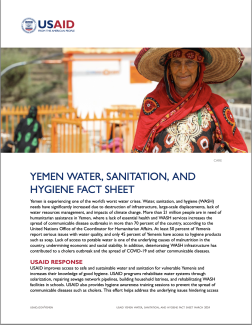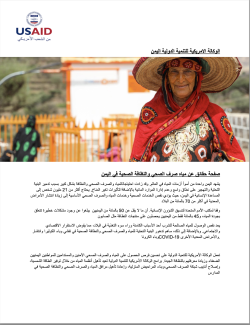Yemen is experiencing one of the world’s worst water crises. Water, sanitation, and hygiene (WASH) needs have significantly increased due to destruction of infrastructure, large-scale displacements, lack of water resources management, and impacts of climate change. More than 21 million people are in need of humanitarian assistance in Yemen, where a lack of essential health and WASH services increases the spread of communicable disease outbreaks in more than 70 percent of the country, according to the United Nations Office of the Coordinator for Humanitarian Affairs. At least 50 percent of Yemenis report serious issues with water quality, and only 45 percent of Yemenis have access to hygiene products such as soap. Lack of access to potable water is one of the underlying causes of malnutrition in the country, undermining economic and social stability. In addition, deteriorating WASH infrastructure has contributed to a cholera outbreak and the spread of COVID-19 and other communicable diseases.
USAID RESPONSE
USAID improves access to safe and sustainable water and sanitation for vulnerable Yemenis and increases their knowledge of good hygiene. USAID programs rehabilitate water systems through solarization, repairing sewage network pipelines, building household latrines, and rehabilitating WASH facilities in schools. USAID also provides hygiene awareness training sessions to prevent the spread of communicable diseases such as cholera. This effort helps address the underlying issues hindering access to safe water and sanitation, including limited water governance in rural and urban areas. Good hygiene helps community members avoid diarrhea and other illnesses resulting from poor water and sanitation.
KEY RESULTS
Since 2018, USAID has helped vulnerable Yemenis access clean water, improved sanitation services, and delivered hygiene awareness messages and sessions to prevent the spread of communicable diseases such as cholera and COVID-19.
USAID assistance has:
- Helped 1.8 million vulnerable Yemenis access clean water and improved sanitation services.
- Increased access to water for more than 650,000 beneficiaries through rehabilitation, construction and solarization of 35 water systems.
- Improved sanitation services for more than 600,000 Yemenis by repairing/installing 3,172 meters of sewage networks, installing toilets and handwashing stations at health facilities, and constructing 50 household latrines.
- Conducted 36,551 hygiene promotions and behavior change sessions benefiting more than 500,000 Yemenis on hygiene practices for maximizing the health benefits of safe water sources and sanitation facilities as a vital step toward curbing diseases.
- Distributed 163 personal protective equipment and cleaning supply kits to health workers.


